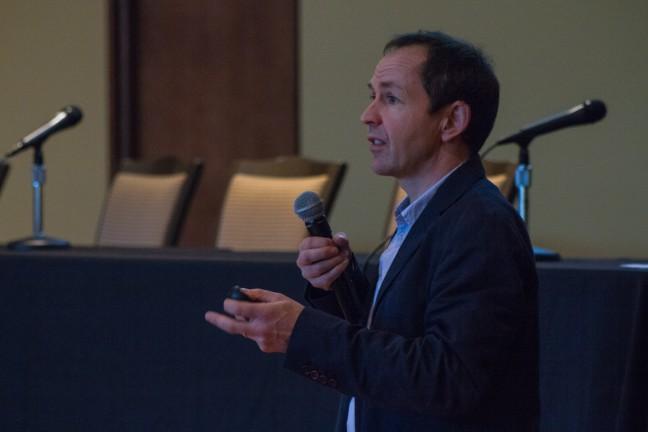Focusing on the mission to move “forward to zero waste,” University of Wisconsin’s Office of Sustainability held a forum on recycling and consumption Thursday.
Keynote speaker Craig Benson, the director of Sustainability Research and Education at the Office of Sustainability, focused on the current “mining conundrum” the United States is facing in his forum titled ‘Rethinking Our Consumption: Beyond Reduce, Reuse, Recycle.’
Benson showed images of modern energy efficient pieces of technology, such as iPhones, electric cars, bicycles and solar panels. Benson said each piece of technology requires a large amount of energy to be mined for its parts, so they are not entirely innocent mechanisms for sustainability.
“All of these things we like in terms of sustainability actually still have a carbon footprint,” he said.
The United States mined a majority of the elements needed to produce common technology, but most of that has since been outsourced because of the cost and difficulty of forming mines in accordance with regulations in the states, Benson said.
As a result, America “translated that problem somewhere else while still consuming at home,” Benson said. Because most of the outsourced mining is extremely harmful to the environment it should be brought back to the United States, where there are more regulations, he said.
“The message is that we need to be responsible consumers and extract our resources responsibly at home,” Benson said.
Following Benson’s presentation were four rapid-fire presentations. Dennis Ramirez, Keari Bell-Gawne and Jonathon Elmergreen, Ecomotion co-founders, presented their application, which aims to decrease society’s commute-caused carbon footprint.
The app uses different types of motivation to alter people’s carbon footprint, inducing travel plans. It recognizes that different factors motivate different people, and uses them to encourage walking and biking alternatives to driving.
Ben Fraser, UW Athletics director of external engagement, presented a commitment to create a zero waste stadium. He focused on the success UW has had recently, recycling 50,300 pounds of materials in 2013, a large improvement from the 4,780 pounds in 2011.
Fraser said UW Athletics was educating people on recycling, growing its volunteer program, changing vendors and introducing composting to the stadium to move toward its goals. UW was ranked No. 24 nationally in total pounds recycled at the Game Day Recycling Challenge.
Kathy Kuntz, executive director of Cool Choices, highlighted that small actions can make big changes when “cool choices” become the norm. Cool Choices is a nonprofit organization that inspires individuals and communities to adopt sustainable practices.
Kuntz organizes games for different businesses that challenge employees to decrease their carbon footprints to create an environment that respects and adheres to goals for sustainability.
“Our game is very deliberately staged to help them see that what they are doing matters, and as a result takes us from single actions to social movements,” she said.













